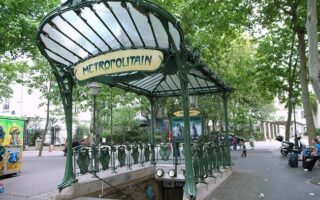Op-Ed: Tough Days for France
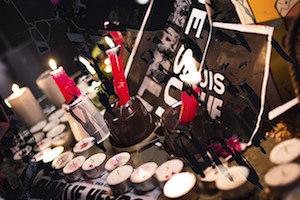
- SUBSCRIBE
- ALREADY SUBSCRIBED?
BECOME A BONJOUR PARIS MEMBER
Gain full access to our collection of over 5,000 articles and bring the City of Light into your life. Just 60 USD per year.
Find out why you should become a member here.
Sign in
Fill in your credentials below.
 It’s been a tough few weeks for France.
It’s been a tough few weeks for France.
On Wednesday, January 7, my husband stood transfixed in front of the television, muttering something about “some shooting somewhere in Paris.” Soon, it became more specific: The shooting took place at the headquarters of the satirical magazine Charlie Hebdo in the 11th arrondissement, not far from where we live. “They say Cabu and Wolinksi were shot,” he told me, referring to two of the oldest and best known cartoonists. “No,” I said, “not possible.”
But it was, and it only got worse from there. We learned that with a few lucky exceptions the entire staff present that day for the weekly story conférence, the first of the year, was dead – gunned down by two black-clad, heavily armed terrorists getting revenge for Charlie Hebdo’s reproduction of drawings of the Prophet Muhammed.
Charb, as the director, Stephane Charbonnel was called, had been threatened and had round-the-clock police protection. For him, writing and drawing what he wanted was a question of freedom of the press and he never considered the idea of ceasing criticism of Islamic fundamentalists, one of the paper’s favorite targets. Besides, the journalists were having fun doing their jobs which consisted of mocking sacred cows. Amongst those sacred cows were policemen, politicians, the military, Catholic priests, corporations, and “jerks” in general. That’s a lot of people.
When the killers ran out into the street, they brandished their kalachnikovs and yelled triumphantly “We killed Charlie!”
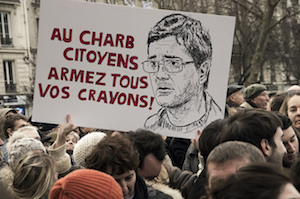 But they didn’t, of course. A groundswell of indignation, emotion and solidarity arose in France, culminating in a march of millions all over the country on Saturday and especially Sunday in Paris.
But they didn’t, of course. A groundswell of indignation, emotion and solidarity arose in France, culminating in a march of millions all over the country on Saturday and especially Sunday in Paris.
Young people and old people bore signs proclaiming “Je Suis Charlie” and marched for freedom of the press. They marched in honor of the journalists and the police killed by the two terrorists and in honor of the four Jewish people murdered in the kosher grocery store, the victims of a third terrorist in a separate but related attack.
The three terrorists were killed by French police.
All through the days that followed, stories of unlikely heroes such as the young African Muslim employee at the kosher store who saved the lives of the Jewish hostages, surfaced. There was good amongst the bad and a desire for all of the communities to come together against violence. There was a solemn state funeral in the courtyard of the Prefecture de Police for the 3 police men and one police woman, burial services in Israel for the four Jewish victims, and poignant individual funeral services for the staff members of Charlie Hebdo at various cemeteries in Paris and outside.
The nine days following the shocking terrorist attack has been a time of tears, a time of reckoning and reflection, and a time of questioning.
What comes next?
Many things: more police protection, more surveillance of potential terrorists, one might say, “the usual.”
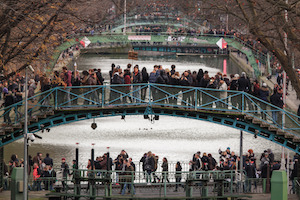 But here’s something unusual – and chilling. After the initial show of solidarity, it turned out that not everyone was “for” Charlie. In approximately 200 schools in France students had flatly refused to observe the minute of silence for the victims of the attacks. Not only is this something that was reported on the news, but it is something that was also confirmed to me firsthand from a young professor who teaches in one of these schools.
But here’s something unusual – and chilling. After the initial show of solidarity, it turned out that not everyone was “for” Charlie. In approximately 200 schools in France students had flatly refused to observe the minute of silence for the victims of the attacks. Not only is this something that was reported on the news, but it is something that was also confirmed to me firsthand from a young professor who teaches in one of these schools.
Shocking? Not when you hear where those schools were. Most are located in dreary suburbs, far from the Eiffel Tower and the chic Parisian shops tourists adore so much. When you grow up in a sad looking place where there’s not much to do and no jobs (the unemployment rate in these areas is twice as high as elsewhere) you’ve got a lot of time on your hands and no inherent “respect for the Republic” or even school. Hope may be somewhere for these kids, but it isn’t where they live.
Years ago when writing about education in France, I was talking to a young friend who taught in one of these towns (Grigny). He told me (gently) that he thought a reality check might be in order for my chapter on Education in France which was based on my experience in a posh western suburb. I took him up on his offer to visit his class and drove through the dilapidated suburbs to my destination, a school basically like any other except for its majority population of immigrants. My young friend obviously had figured out how to deal with these students who, unlike their peers in Neuilly or chic Paris, went home at night either to parents who were there but who didn’t speak French and couldn’t help them, or to parents who weren’t there at all because they were working. His main job was in getting their respect and he did, spending the first 45 minutes of the class simply keeping the kids in line. The last 15 minutes were spent in discussing the content of the lesson. Most were barely interested and dismally behind.
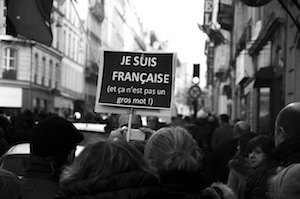 That experience came back to me as the names of Grigny and other dreary suburbs were rolled out by newscasters today announcing police raids of possible accomplices of the terrorists.
That experience came back to me as the names of Grigny and other dreary suburbs were rolled out by newscasters today announcing police raids of possible accomplices of the terrorists.
I concluded that an entire group of people had been missing at the solidarity march. Where were those kids from the outlying areas? Did they not feel French? Obviously not. And whose fault is it?
That one’s easy. Just look back to the 2005 riots in which young disenfranchised people took to the streets of Paris to wreak havoc and burn cars. Everyone was shocked and the politicians all made noises about change. But nothing changed, and it’s in these same neglected places that the young people no one cares about are leaving to fight in Syria.
The government had an excellent opportunity to focus on these forgotten young people and they did – for a while. What’s needed now is a Marshall Plan for education, a plan that will bring these young people back to the Republic – if it’s not already too late.
– Harriet Welty Rochefort
author “French Fried, “French Toast“, and “Joie de Vivre” (St. Martin’s Press)
Harriet’s Email
photo 1 by Dean Terasaki [CC BY-SA 2.0] via Flickr
photo 2 by Romain Lefort [CC BY-NC-SA 2.0] via Flickr
photo 3 by Kwikwaju [CC BY-NC 2.0] via Flickr
photo 4 by Romain Lefort [CC BY-NC-SA 2.0] via Flickr
More in Charlie Hebdo, French news, News in France
